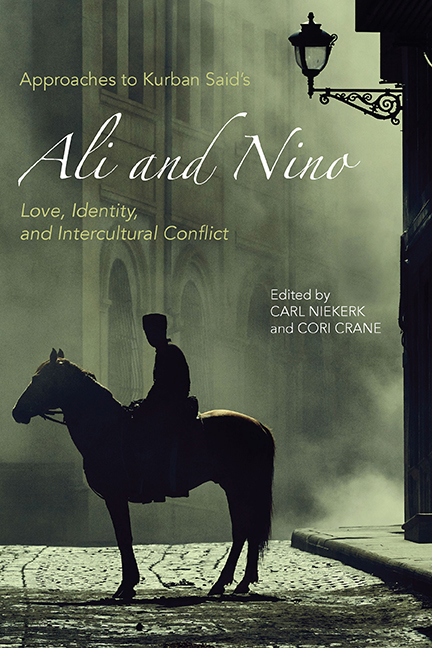Book contents
- Frontmatter
- Contents
- Acknowledgments
- Notes on Editions of and References to Ali and Nino
- Introduction: Ali and Nino as World Literature
- 1 Ali and Nino: The Novel as/of Cultural Translation
- 2 Crossing Borders, Crossing Disciplines: Ali and Nino in the Twenty-First Century
- 3 Glowing Rubies and Persian Daggers: The Role of Persian Poetry in Ali and Nino
- 4 Gendered Stereotypes and Cross-Cultural Moral Values through the Eyes of Kurban Said
- 5 Orientalist Itineraries: Cultural Hegemony, Gender, Race, and Religion in Ali and Nino
- 6 Gendered Conflicts in Muslim and Christian Cultures: Honor (and Shame) in Ali and Nino
- 7 Love and Politics: Retelling History in Ali and Nino and Artush and Zaur
- 8 “Herr Professor, Please: We'd Rather Stay in Asia”: Ali Khan Shirvanshir and the Spaces of Baku
- 9 The Female Body and the Seduction of Modernity in Ali and Nino
- 10 Seeing the Unseen: Symbolic Writing in Ali and Nino
- 11 Ali and Nino and Jewish Questions
- 12 Between Orientalism and Occidentalism: Culture, Identity, and the “Clash of Civilizations” in Ali and Nino
- Works Cited
- Notes on the Contributors
- Index
2 - Crossing Borders, Crossing Disciplines: Ali and Nino in the Twenty-First Century
Published online by Cambridge University Press: 30 August 2017
- Frontmatter
- Contents
- Acknowledgments
- Notes on Editions of and References to Ali and Nino
- Introduction: Ali and Nino as World Literature
- 1 Ali and Nino: The Novel as/of Cultural Translation
- 2 Crossing Borders, Crossing Disciplines: Ali and Nino in the Twenty-First Century
- 3 Glowing Rubies and Persian Daggers: The Role of Persian Poetry in Ali and Nino
- 4 Gendered Stereotypes and Cross-Cultural Moral Values through the Eyes of Kurban Said
- 5 Orientalist Itineraries: Cultural Hegemony, Gender, Race, and Religion in Ali and Nino
- 6 Gendered Conflicts in Muslim and Christian Cultures: Honor (and Shame) in Ali and Nino
- 7 Love and Politics: Retelling History in Ali and Nino and Artush and Zaur
- 8 “Herr Professor, Please: We'd Rather Stay in Asia”: Ali Khan Shirvanshir and the Spaces of Baku
- 9 The Female Body and the Seduction of Modernity in Ali and Nino
- 10 Seeing the Unseen: Symbolic Writing in Ali and Nino
- 11 Ali and Nino and Jewish Questions
- 12 Between Orientalism and Occidentalism: Culture, Identity, and the “Clash of Civilizations” in Ali and Nino
- Works Cited
- Notes on the Contributors
- Index
Summary
LEV NUSSIMBAUM—alias Essad Bey, alias Kurban Said—situated the eponymous hero and heroine of his 1937 novel, Ali and Nino, at linguistic, geographic, national, religious, and cultural crossroads. The love story begins in the city of Baku in the Caucasus, a region with a checkerboard of over fifty ethnicities, among them Armenians, Azeri, Daghestani, Georgians, Persians, Russians, and Turks. The Caucasus region is geographically situated along the historical borders between Europe and Asia, between Christianity and Islam, and between the Shi'ite and Sunni branches of Islam. Most of the action takes place in Azerbaijan with one significant sojourn into Persia, which in the imaginary space of the novel becomes a secluded haven isolated from political strife.
In an attempt to understand themselves, each other, and the intersecting positions they occupy, the Muslim Ali and Christian Nino must respond to and assess their constantly shifting and opposing environments against the backdrop of the First World War and the Russian Revolution. They seek and briefly find a middle ground, a utopian space of understanding and acceptance that historical reality renders impossible. One's understanding of the characters becomes more entangled still upon realization that their story was penned in German by a Jewish Azeri, Lev Nussimbaum, who converted to Islam, published under two pseudonyms, and died in Italy while fleeing the Nazis. Such complexity defies attempts to settle on a definitive interpretation of the text while demanding exchange as a prerequisite to deeper understanding: exchange between the text, its readers, and a wide range of other sources. This insistence makes Ali and Nino an ideal text for teaching textual analysis as a hermeneutic process, and for helping students develop interpretive and research skills.
As authors of this article, we come to our subject from different disciplinary (German studies and Near East studies), national (American and Iranian-Canadian), and religious (Christian and Muslim) backgrounds. Our discussions have led to our use of the novel in three very different classroom settings (a senior capstone course, taught in German, on encounters between East and West, and two junior-level courses, taught in English, on women and Islam and on women in Near East history) at two different universities.
- Type
- Chapter
- Information
- Approaches to Kurban Said's Ali and NinoLove, Identity, and Intercultural Conflict, pp. 29 - 49Publisher: Boydell & BrewerPrint publication year: 2017

